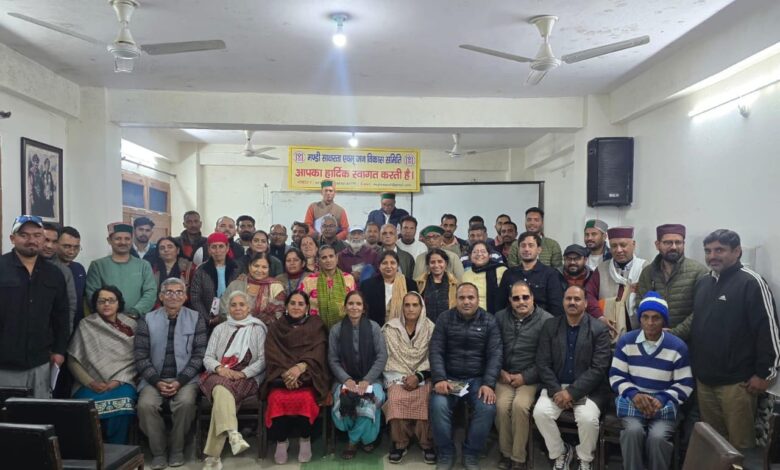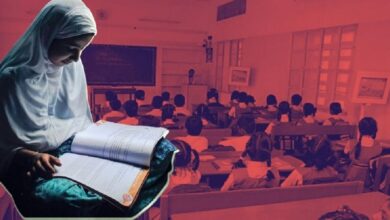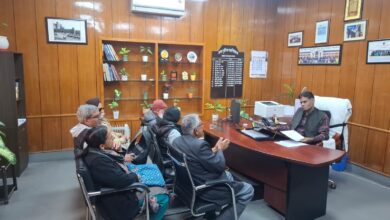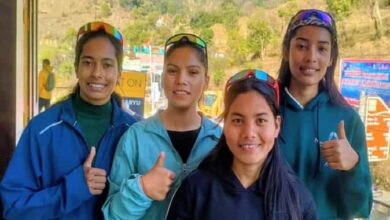Himachal Pradesh disaster-affected communities raise alarming concerns at people’s public hearing

Himachal Pradesh disaster-affected communities raise alarming concerns at people’s public hearing
Shimla, Nov 15
At a day-long People’s Public Hearing held at Saksharta Bhavan, Mandi, more than 70 disaster-affected residents from Mandi, Kangra, Kullu, Kinnaur, Lahaul and other regions gathered to present their grievances before a seven-member civil society panel, today. Organised as part of a broader two-day programme involving grassroots organisations from across Himachal Pradesh, the hearing offered a rare public platform for affected communities to speak directly about loss, exclusion, and the systemic gaps that continue to deny them justice.
Participants shared deeply personal testimonies of loss: damaged homes, devastated farmland, wiped-out livelihoods, destroyed roads, unsafe settlements, and fractured futures. Yet almost every testimony pointed to something more troubling—that relief, rehabilitation and reconstruction remain painfully slow, opaque, and inconsistent, even as disasters intensify year after year.
One of the foremost concerns raised throughout the hearing was the pending compensation for farmland loss and damaged houses, especially in the most severely affected pockets of the state. Speakers emphasised that while immediate relief payments of ₹1.30 lakh were distributed to many in the aftermath, this was uneven and has not been followed by timely assessments or the release of comprehensive compensation under the Special Relief Package (SRP). Numerous participants said they remain in limbo, uncertain whether they are even on the official lists.
A lack of transparency in survey processes was a recurring issue. From Siraj, Kesari Devi and five other women narrated how names were arbitrarily added and removed from survey lists, with no explanation offered. Several families who lost homes were told they were ineligible for rental relief unless they first moved into government relief camps—an unreasonable demand for many who had already found temporary accommodation with relatives or on rent.
The issue of survey eligibility criteria for the Special Relief Package also came under sharp scrutiny. Participants noted that families with ancestral homes in far-off villages were struck off the list despite losing the houses they currently lived in. Similarly, nuclear families who had separated from joint households were not being recognised as independent units. The burden of this exclusion falls disproportionately on single women, many of whom had built small independent structures near their parental homes that were washed away in disasters but are still not considered eligible for SRP assistance.
From Chowki Baladi, Neetu Ram shared the devastating impact of the Malana Dam burst, which destroyed his home and belongings. Despite the scale of destruction, he has not received any relief, illustrating how affected people often slip through administrative and political cracks even in high-profile disaster cases.
A major issue that cut across testimonies was landlessness and the absence of clear rehabilitation pathways. Speakers from Jogindernagar, Bungrail Chowk (Siraj), Lindur village (Lahaul) and other locations stressed that when houses are declared unsafe or swept away, people are prohibited from rebuilding—yet no land is provided for relocation. Much of the suitable land falls under the Forest Department’s jurisdiction, requiring central government clearance, which can take years. Participants urged the central government to take swift action, emphasising that displacement without rehabilitation is abandonment.
Speakers from Kinnaur, Mandi and Kullu also highlighted the mounting ecological pressures caused by relentless road construction, unregulated cutting, and unchecked muck dumping. They argued that these practices, combined with large-scale dam development, are creating cascading risks in an already fragile terrain. The disasters in Mandi town this year were repeatedly cited—many attributed the severity of destruction to road-widening, tree felling, and blocked nallahs, for which departmental oversight remains weak.
Independent journalist and advocate Rajneesh Sharma raised serious concerns about the impact on education. In several disaster-hit villages, secondary school students must walk long distances on unsafe terrain, while primary school buildings in certain villages remain non-functional months after the monsoon, leaving younger children out of school altogether. He also condemned the interference of political interests in reconstruction work, emphasising that disaster recovery must not become a tool for patronage or influence.
He called for full transparency and strict accountability in how the state allocates and spends disaster relief funds.
Understanding the growing impacts of climate change also formed an important part of the discussion. From Lahaul, Sunita Katoch highlighted repeated flash floods in smaller streams such as Jahalma, linking these to glacial retreat and altered weather patterns. Speakers stressed the need for widespread climate awareness so that communities can better understand the ecological shifts shaping their lives.
From Kullu, Lal Chand Katoch spoke strongly against mindless tourism and recalled the long community-led legal struggle against the proposed Ski Village project, backed by a multinational corporation. He urged people to remain vigilant and take collective responsibility to prevent destructive projects from entering ecologically sensitive Himalayan regions.
The Divisional Magistrate of Mandi, who briefly attended the opening session, acknowledged the seriousness of the landlessness issue and said the matter was being taken up by the state with the central government. He also reiterated the administration’s willingness to address grievances regarding the Special Relief Package.
Panel Members – Guman Singh, Vimla Vishwapremi, Jaya Lal Negi, Dipender Manta, Nirmal Chandel, Chandrakanta and Manshi Asher will prepare their report with recommendations for submission to the government in the coming days.
The hearing was organised by over a dozen civil society groups—including Ekal Nari Shakti Sangathan, Land Acquisition Affected Forum, Himalaya Niti Abhiyan, Himalok Jagriti Manch, Himachal Gyan-Vigyan Samiti, Himdhara Environment Collective, Jibhi Valley Tourism Development Association, Loktantra, Democratic Nation-Building Campaign, Mandi Literacy Committee, People for Himalaya Campaign, Mountain Women’s Rights Forum, People’s Campaign for Socio-Economic Equality, Save Lahaul-Spiti and the Tower Line Affected Forum. The groups will meet tomorrow, 16 November to discuss future advocacy strategies around disasters.






